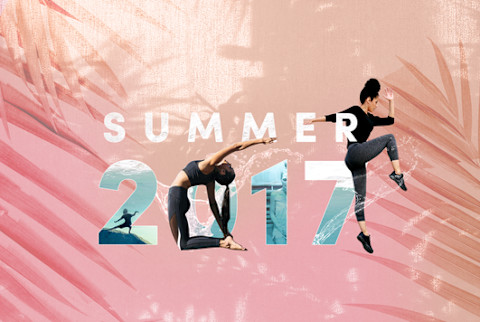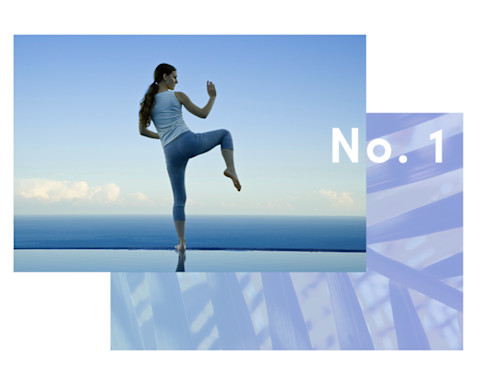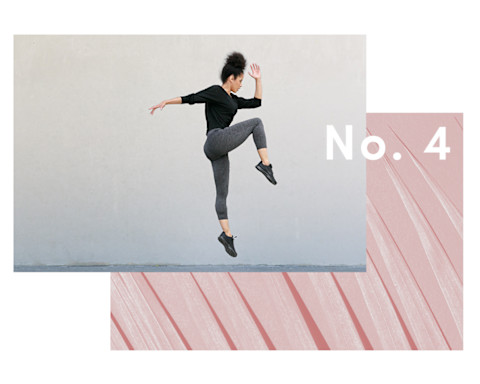Confirmed: Mindful Fitness Is On The Rise This Summer. Here Are The Trends You Need To Know About

In the not-so-distant past, exercising regularly meant spending your time and money at competitive indoor classes, straining away at boot camps, or pounding the pavement running until your arms and legs were shaking. But this summer, the slow fitness movement reigns supreme, and its rise is reaching every corner of the fitness world, changing how we move, dress, breathe, and sweat. After years of pushing our bodies hard, the time is here for us all to take a collective exhale and recalibrate to a gentler pace. The top eight fitness trends of 2017 reflect this newfound focus on repairing, restoring, and regenerating.
1. Slower, restorative styles of movement are front and center.

Pushing and forcing your way through different poses is no longer the norm. The yoga landscape has shifted from intense power flows, and now our Instagram feeds are flooded with posts that point to rejuvenating, increasingly mindful yoga styles like restorative yoga, yoga nidra, and qigong, a traditional Chinese movement practice.
"Qigong is arguably the original stress reduction tool because it dates back to a time before Lao Tzu, Patanjali, or even The Buddha," says Anthony Korahais, Flowing Zen founder and National Qigong Association board member. "The modern world is falling in love with ancient mindfulness arts because we desperately need to relieve stress and improve healing. So far, qigong has not seen the attention that I think it deserves, but I believe that this will change over the next 10 years, and that we'll see qigong take its rightful place among other mindfulness arts like yoga, tai chi, and sitting meditation."
In addition to mindbodygreen's tai chi class launch last month, yoga studios are now hosting workshops on tai chi and qigong, and popular New York studios have added yoga nidra to their weekly schedules.
2. Walking is having a moment.

Not a runner? No problem. This summer, exercise enthusiasts are taking a more mindful approach to movement by getting back to basics with their bodies and embracing movement that's easier on the body. A study published in PLOS One last month found that walking outside led to significantly elevated mood, while another study, out this month, found that more Americans than ever are walking for exercise—65 percent of women walk regularly, while 63 percent of men do.
"Walking is being rediscovered as the great pick-me-up it is. Why? Because in stressful times, we need something simple, something direct, something that lifts our spirits, juices our joints, makes us feel alive," says Marilynn Preston, wellness expert and author of the new book All Is Well. "The impact is immediate! We don’t have to wait in line, or buy fancy gear, or reserve courts. To walk is to assert our independence, the freedom to do, to be, without complication. We put one step in front of the other—slowly, quickly, whatever pace suits us. We are in control. No one to answer to, nowhere to go, nothing to do except walk. Like plants to the light, we crave that which rejuvenates us and brings us joy."
As a bonus, you don't need high-tech running shoes or clothing you can sweat in—you can incorporate walks into your workday or create an after-dinner ritual with your partner.
3. The future of athleisure is looking "smart."
Athleisure has seen an evolution over the past year, embracing workwear, the minimalist onesie, and more. And this summer, "smart" gear—or clothing that encourage proper form and focus on specific areas through gentle vibrations—are front and center.
"The reason technology-enabled clothing is so popular is because it empowers you with your own data," says fashion technology company Wearable X founder Billie Whitehouse. "Everything we have seen up to this point has been a very limited look at a human's personal data. Now that we have products like this, we are in a far better position to understand the body and how it works in its entirety rather than just [gathering data] from your wrist or your smartphone."
While athleisure that connects to your smartphone is still a rarity, other activewear companies are working hard to create clothing that supports your body in new, innovative ways. Lululemon's new high-tech Enlite bra, a runaway hit we saw on women all over Instagram, moves away from preventing breast movement and uses unique fabric and material to help support natural bounce without compromising comfort or performance.
4. Workouts are taking up less of our time and giving us better results.

As we've come to understand the mechanics of our bodies better over time, we've figured out ways to work our bodies more effectively in shorter bursts of time. Shorter workouts like high-intensity interval training, or HIIT, can take effect in as little as 20 minutes. Lower the stress load on the body from that of a 60- or 90-minute workout to a breezy 20 minutes can make for lower cortisol levels in exercisers, which leads to lower levels of inflammation in the body.
"For me, running or HIIT no more than twice a week, coupled with lots of restorative yoga, sleep, and water are what I need to feel balanced," says yogi and Breaking Vegan author Jordan Younger, who found that taking her workout routine down a notch led to surprisingly great results. In other words, you don't need to log 6 miles a day on the treadmill. Now, the focus is on working out smarter, not longer, while making sure to prioritize mindful practices along the way.
While HIIT has been around for a long time, the idea of spending less time exercising to make room for other important wellness habits (like sleep!), is only getting more popular. This summer, the super-popular Australian workout F45, which emphasizes short but effective workouts, is coming to the United States with full confidence that it will be just as successful stateside.
5. Athletes are embracing yoga as a way to enhance performance.
Most athletes have always known, at least in a vague sense, that the mobility and strength that come with a regular practice lead to improved performance. But this year, athletes around the world are embracing yoga and other low-impact recovery tactics as vital to helping them reach their performance goals.
A group of USC football players recently came out saying yoga improves both their mental and physical performance, and one high school in Stephenville, Texas, gave its athletes the option of taking a weekly vinyasa flow class this summer—and 130 of them signed up.
Detroit NBA player Tobias Harris says that he has seen yoga and other active recovery tactics everywhere in the athletic world this summer. "Active recovery has without a doubt become more of a trend for athletes," he tells mbg. "It's a way to stay in shape during the season without putting a heavy load on your body. For myself, I use practices like yoga, and sometimes 15-minute walks in the mornings. All of these active recovery activities have an impact on performance. It feels great to get the blood flowing, which helps the body recover from a long season. Plus, yoga brings a sense of peace, self-awareness, and relaxation to me."
6. Longevity is front and center.
Working out long and hard on a daily basis is extremely hard on joints and muscles. While it may yield some flashy short-term results—like the once-coveted six-pack abs—it leads to injury and spiked cortisol down the road. "As someone who used to have a skewed relationship with working out, I'm so happy the attitude is shifting," says yoga instructor Jules Hunt. "I think people are finally listening to their bodies and realizing one size does not fit all. For me, it's all about longevity—it's possible to work hard, break a sweat, and not destroy all of your joints in the process. That's why yoga, barre, and boxing are my go-to workouts. I'm finally in a mindset where I am more focused on exercising for my long-term health, and not just for six-pack abs."
With the hope of giving people the tools to exercise throughout their whole lives, the buzziest new studio openings this summer include dance classes, yoga and barre studios, and a new Tracy Anderson location (her workouts are notoriously low impact!) in Midtown Manhattan.
7. Five a.m. workouts are out; sleep is in.

Napercise. Sounds like a dream come true, right? Well, now it's a reality—in late spring, a gym in the United Kingdom announced that it would be offering 60-minute group napping classes this summer. The classes start and finish with tension-relieving stretching exercises, complete with a 45-minute nap.
There's a good reason sleep is being added to exercise schedules: It's considered the new "vital sign," according to sleep expert Michael Breus, Ph.D. "If there's something wrong with your sleep," he tells mbg, "chances are it's affecting something else, causing weight gain, brain fog, or worsening a chronic disease."
Even if their gyms don't offer napping classes just yet, boot camp enthusiasts are now opting for an extra hour of sleep in the name of their health. After all, they can always take a qigong class after work.
8. Passive recovery isn't going anywhere.
While the buzz surrounding passive recovery tactics like cryotherapy and infrared saunas started in the last year or two, if their prevalence on Instagram is any indication, they're hotter (and colder) than ever this summer. Golden State Warriors players Stephen Curry, Andre Iguodala, and Shaun Livingston utilize freezing cold cryotherapy chambers regularly in the name of recovery, and a cryotherapy spa is opening in San Francisco this summer.
On the flip side, infrared saunas, which utilize heat to ease muscle tension and improve mood, are still having their moment in the sun. Popular studio HigherDOSE just announced a partnership with popular New York Hotel 11 Howard, giving hotel guests access to this form of therapy.
"Infrared heats raises your core body temperature," explains HigherDOSE founder Lauren Berlingeri. "It's a much gentler, more effective way of heating your body. We compare it to the sun. It's a therapeutic, nourishing feeling." Can't argue with that.
Want to brush up on other trends in the wellness world? Here's everything you need to know about what's trending in the food world right now.
